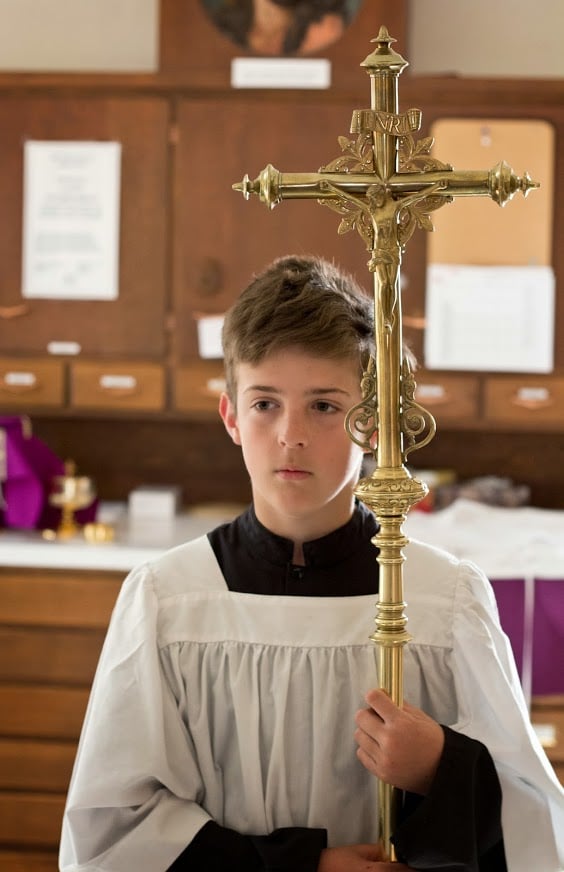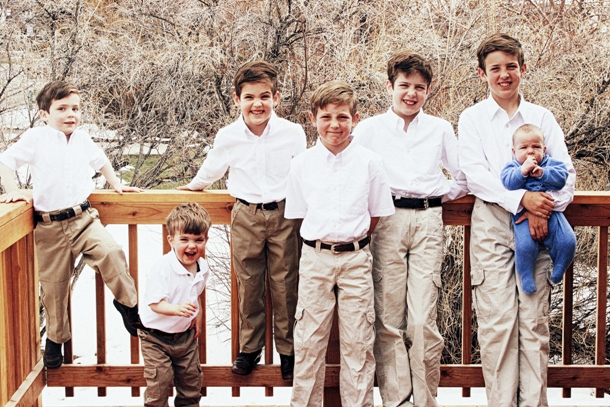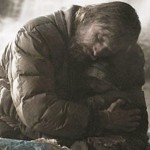“Where have the actors gone?
The play has ended; the curtains drawn.
There’s no applauding now, no cheering crowd;
No autographs, no curtain calls;
An empty stage, a silent hall.”
I suppose it’s not surprising that I jumped so eagerly at the question when Elizabeth first proposed it as a topic for our symposium on the upcoming synod.
“Where have all the men gone, you ask? They’re not gone,” I quipped. “They’re in my house.”
True, I jumped at it in part because I could start things off with a joke, and I am nothing if not superficial. But I also jumped at it because there is some truth in my response: the Men of Tomorrow’s Church are in my own home, and in the houses and homes of countless families scattered throughout the country (and throughout the world). And that scares me, honestly, because what I really want to know is the answer to a slightly different question:
I don’t wonder where the men have gone. I wonder how we’ll get them to come back.
The causes behind the distressing dearth of males actively participating in the American Catholic Church are many and well-documented, and I don’t trust myself to do them justice. Dysfunctional families, absent fathers, social and economic burdens, “Spiritual-But-Not-Religious” — the list goes on; all relevant, and all manifesting trends that seem increasingly difficult to reverse. Our own Sherry Weddell has written at great length (and with far more authority than I) on the demographic and cultural forces that lie beneath the Church’s shifting landscape, and for those seeking a more systematic, less anecdotal discussion, I heartily recommend “Forming Intentional Disciples.” (CliffNotes Version: Do not despair. For He has overcome the world.)
For me, though, as I look around my own little parish church or sit listening to the deliberations of my own little Parish Council, it feels like we’ve lost an entire generation of men — or maybe even two. But should we really be surprised when, as religion becomes an increasingly cultural practice rather than a spiritual one, that our men seem to be vanishing in ever-increasing numbers? They care far less about the sustenance of cultural mores than their feminine counterparts, and if religion is a cultural matter (they think to themselves), it’s for the women-folk. (Is that really a new problem? Or just a particularly painful one for those of us going through such a church-wide shift in religious practices as we’re experiencing now?)
So, I wonder to myself, where have they gone? Why did they go? And as I sit at my dinner table, surrounded by my seven sons, I wonder most of all: “How do we get them back?” Because I’m deathly afraid that some of my sons will become those missing men.
As I frequently find myself saying, I feel ill-equipped to speak to the larger, institutional issues. That’s why we’re having a synod, right? But as the father of seven potential men, I can tell you one place where I am convinced that manliness must be present in order for the rest of our Missing to follow:
On the altar. And the more my sons see it, the better.
It’s a understandable (even justifiable) instinct to respond to the abuse crisis by pulling back and protecting one’s children from too-frequent interaction with the clergy. But there’s a vital role to be played by such interaction, and I’ve seen it playing out with my sons. Men — full-grown and fledglings alike — frequently experience the manly vocation of giving oneself up for the sake of one’s physical family. Many of them live in just such a situation, after all; or at the very least, see those situations with regularity. But choosing to give oneself up for the sake of people who are not even related to you? Giving yourself up for a spiritual rather than a physical family (including giving up the opportunity for the very familial love and support so common in daily life)? That’s a truly impressive sacrifice, and one that will make my sons pause and consider the value of a religion and a vocation that attracts such sacrifice.
So my sons and I have a deal. We don’t always go to Daily Mass in the Susanka household, but I will always take them up to the church. Any day; every day. Without question. And I am convinced that their faith is strengthened every time they see our parish priest up there on the altar — or any man on any altar, actually. Maybe not in obvious ways, and maybe not even in ways they will recognize any time in the future. But it’s there, all the same. (We’re particularly blessed that our priest is a wonderful and holy man. He’s also virile and down-to-earth and fun and …manly. How else can one describe a priest who soldiered through several months of shoulder pain before finally getting rotator cuff surgery for an injury suffered snowmobiling? Now, there’s a guy to make my sons sit up and take notice! …and they do.)
You know who else I’m convinced needs to be on the altar as often as possible in order for my sons to stay UnMissing? They do. It’s not as easily quantified or codified in my kind, but I’m convinced that taking an active role in the celebration of the Mass is absolutely vital to their development as men. (Being within yards of Him on a regular basis will certainly teach one a thing or two about sacrifice, right? And about manliness, as well. About the importance of serving others, and the fact that serving and supporting and diminishing oneself for the sake of others — or for His sake — doesn’t make one less manly, but more so.)
And so, I strive to encourage altar serving in our house, as well, with the same ultimatum as I have for Daily Mass. “I will always take you to serve Mass,” I tell them. “No exceptions. Always. Just say the word.” And my heart is gladdened (and lightened) by the number of times they make that choice. Dominic, in particular, has made great strides spiritually since he began serving Mass regularly. I’m not surprised, I suppose. Yet I’m still a bit amazed at how wonderful it is to watch him growing into a serious little man right before my eyes.
But you know who really needs to “Man Up” and take their faith seriously in order for my sons to succeed?
Me, myself.
Because no matter how devoutly and earnestly their mother and their priest(s) and their various youth group leaders and camp counselors take the faith, it does my sons no good if I don’t take it seriously myself. If I slough my religious obligations off as “cultural” or convince myself of my “spiritual, not religious” tendencies (aka, give in to my natural laziness), it will not disenfranchise my wife’s efforts entirely, nor will it destroy the work of the other religious leaders with whom my sons regularly interact.
But it will discredit and undermine them.
I don’t just need to be faithful; I need to act faithful. Walk the walk, as they say. Because that’s what my sons will see. That’s what they’ll remember. And that’s what they’ll emulate. Just as they are moved to take their faith more seriously by watching their priest(s), their mother, and various other spiritual, so, too, they are moved to a deeper, more devout faith by watching me live out my own. Only it’s more necessary for me to give the that example than it is for anyone else, whether I like it or not. The men have gone missing from our Church because their fathers went missing before them. That’s the real reason; I’m sure of it. And I’m just as sure that nothing will have a greater impact on whether my sons go Missing or Not than will the witness of my presence. Or its absence.
And that’s what scares me the most.













